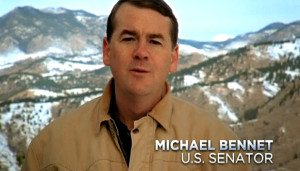
When you see or hear an advertisement purporting to take the side of consumers, you can be almost sure consumers have nothing to do with it. No single economic issue is big enough for consumers to organize and hire a lobbyist or sponsor an ad campaign. They’re on their own.
Recent radio and TV ads have been urging Colorado Sen. Michael Bennet and his colleagues to reject a House-passed bill that would allow the U.S. to resume crude oil exports after a 40-year ban prompted by the Arab oil embargo. The purported reason: Resumed exports would raise the price of gasoline domestically, thereby benefiting Big Bad Oil and hurting us poor consumers. The campaign is sponsored by an ad hoc organization known as the CRUDE Coalition (Consumers and Refiners United for Domestic Energy).
RUDE would be a better acronym. The campaign is sponsored by a few independent refiners in the south and east, including Alon USA, Monroe Energy, PBF Energy and Philadelphia Energy Solutions. The so-called consumers in the coalition were just dragged along for the ride.
At least the ad demonstrates that the U.S. oil industry isn’t a monolith. The big integrated oil producers — those that refine as well as explore and produce — are pushing the export bill, but some companies that are strictly refineries oppose it because it will cut into their profits.
Refinery profits are determined by something known in the trade as the “crack spread” — the difference between what the refiners pay for crude and what they earn after “cracking” it into useful products such as gasoline, diesel, aviation fuel etc.
Thanks to fracking and other techniques, U.S. oil production is up 90 percent since 2008. The U.S. is so awash in crude — the biggest stockpile in 80 years, according to the Wall Street Journal — some of it has to be stored in chartered supertankers. That’s expensive. Oil is selling below $40 a barrel.
But the refining business hasn’t kept up, thanks to 1) state and federal regulations which delay or prevent construction of new refineries or expansion of existing ones, 2) expensive maintenance costs and 3) the desire of some refiners not to maximize production. When there’s a glut like this they can get crude at a discounted price and increase the crack spread.
Tracee Bentley of the Colorado Petroleum Council — an oil producers group that’s part of the American Petroleum Institute — also notes that most refineries were build years ago to handle heavy crude, but the oil produced in our part of the world is light and sweet. The refineries that can handle it are mostly abroad.
 Bentley said her group has been promoting the export bill to Bennet “ad nauseam — to the point where he’s sick and tired of hearing from us.” He hasn’t taken a position, she said, but will be forced to in the next few days when the bill is expected to come up for a floor vote.
Bentley said her group has been promoting the export bill to Bennet “ad nauseam — to the point where he’s sick and tired of hearing from us.” He hasn’t taken a position, she said, but will be forced to in the next few days when the bill is expected to come up for a floor vote.
Presumably exporting domestic crude would give a boost to the faltering Colorado oil business, which has been cutting back because of low prices.
For that reason alone Bennet should support the bill, but his vote will depend on what “progressive” causes majority Republicans decide to plug into the bill to get Democratic votes and, more important, avoid a presidential veto.
In the kind of deal that would be illegal in the Colorado legislature, where bills have to fit under their title and can’t include disparate elements, the GOP leadership is said to be larding up the export bill with goodies for the enviros. These might include extending wind and solar tax credits and reauthorizing the Land and Water Conservation Fund.
What’s more, the independent refiners may be bought off with some sort of tax credit. That might shut CRUDE up.
Would in fact gasoline prices rise if exports are allowed? Possibly a bit, but refinery profits are unpredictable and don’t depend directly on the price of oil. Presumably refiners would have to pay more for crude if exports are allowed but the price of gasoline is subject to many other variables. For instance, consumer demand tends to drop during the winter.
Successful national economies depend on exports and for years Americans have complained that we’ve stopped manufacturing and are importing too much stuff. Why shouldn’t the U.S. export what it’s good at, which is producing crude oil the rest of the world wants? It’s a wonder that the export ban, passed when oil prices spiked after the Arab embargo of 1973, has lasted as long as it has.
By the way, it’s a little mysterious why President Obama and the Democrats wouldn’t support the export bill even without getting the goodies for the enviros. After all, Obama is committed to raising the price of anything carbon and if exports in fact drive up the price of gasoline for his constituents, that should make him happy.
Longtime Rocky Mountain News political columnist Peter Blake now writes twice a month for CompleteColorado.com. Contact him at pblake0705@comcast.net You may re-publish his work at no charge and without further permission; please give full credit to Peter Blake and www.CompleteColorado.com.


